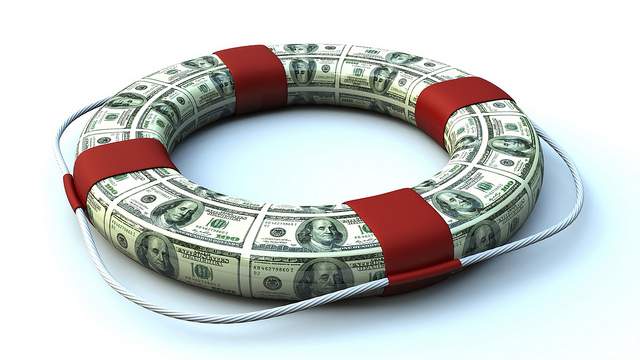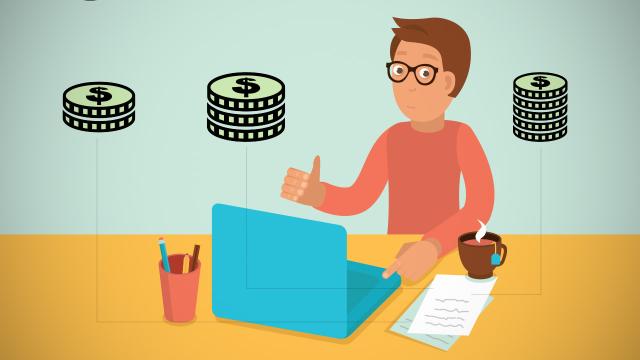Freelancing is rewarding, but it is not for the faint of heart. Yes, you get to do work you love and you get to do it on (mostly) your own terms. You also have play roles you may not enjoy so much, like marketer, sales person and bookkeeper, some of which we’ve talked about before. And one of the biggest challenges in freelancing is managing an irregular income.
Pictures: venimo, Maksym Sokolov, StockMonkeys.com, Dave Dugdale
Before I started working for Lifehacker, I spent over 20 years as a freelance computer consultant and writer. I loved working for myself, almost as much as I love working with the people here, but managing the boom and bust cycle of work was something that never came easy. I did learn some good lessons along the way, though.
Create an Emergency Fund

Everybody should have an emergency fund that they only dip into when they need to cover basic expenses and have no other recourse. You’ve heard this advice from us before. The common wisdom is to keep enough money in your emergency fund to cover six to eight months of bills. If you’re freelancing, you need more.
I recommend at least being able to cover expenses for a full year. Remember that it isn’t just personal expenses you have to think about anymore. You also need to be able to cover business-related expenses and there are some other advantages too:
- You’ll find you aren’t quite as desperate for clients. If a job comes along that, for whatever reason, you don’t feel right about taking, you’ll feel more comfortable saying no or at least taking the time to figure out how much you really need the job.
- If clients can’t (or won’t) pay their bills on time, you have more flexibility in dealing with them. If a good client is going through a rough patch and needs a little more time to pay, it’s a lot easier to work something out with them if you have fallback funds.
- You can take advantage of more opportunities. If an event arises that lets you do some real networking or extend your training, you can think about whether it’s worth putting off clients for that time so you can take advantage of it. A good emergency fund can make that decision easier, though you have to be careful not to make dipping into your fund like that a habit.
Open a Separate Business Account (and Use It)
If you’re freelancing and you’re a sole proprietor, it’s perfectly legal to use the same account for personal and business expenses. It is not, however, a very good idea. Keeping a separate business account, even if you’re just freelancing occasionally on the side, makes it much easier for you to create a viable budget. It also makes tax time less frustrating for you and your accountant.
Use that business account for business expenses, your salary and paying into your superannuation, tax and business emergency fund. And that’s it. If you have money left over, pat yourself on the back and leave it there. You never know what next month is going to be like.
Build Other Funds if You Need Them
As a freelancer, you don’t get perks like superannuation or sick leave. You have to take care of it all yourself. You can absolutely get by just using your regular business savings account and keeping track of how much you’re saving away for different purposes. That’s what spreadsheets and accounting programs are for, right?
It always helped me, though, to have money earmarked for these purposes squirrelled away in their own accounts. Most banks and credit unions will let you open multiple savings accounts, so why not take advantage of that to organise those big expenses you’ll have throughout the year?
Take it from someone who’s been there. You don’t want to come to the end of a quarter or year and realise you haven’t been putting enough aside to pay estimated taxes, an unfortunately common problem among beginning freelancers.
Project Your Monthly Income and Expenses

When you freelance, you’re going to have times when you’re so busy you don’t know if you can handle it. You’re also going to have some nerve-racking times when it seems like you’ll never find work again. This means that your monthly income is likely to vary a lot, something that’s especially true while you’re getting established.
In order to budget with any degree of consistency, you’ll need to project monthly income and expenses. And there are a couple of ways you can approach it:
- Play the averages. Take your yearly income (or expenses), divide by twelve, and use the average as the monthly amount when planning your budget. If you’ve been freelancing less than a year, use the data you have. If your income doesn’t vary too wildly by the month, this method works especially well.
- Expect the worst. If you like playing things a little more conservatively, use the month you earn the least as a minimum monthly income and the month you spend the most as a minimum monthly expense when planning your budget. Since you’ll likely end up earning more and spending less, this method makes a pretty good way to build up that emergency fund too. J.D. Roth, of the financial blog Get Rich Slowly, did a great write-up of using this technique over at 99U. As he puts it:
When I project my cash flow, I base it on my minimum monthly income from the past twelve months. Using my minimum monthly income instead of my average monthly income gives me a safety buffer. And when you have an irregular income, a safety buffer is vital.
Note: If your income is variable, but you know that you’ll always make at least $USX,XXX, then it makes sense to base your budget on $USX,XXX. Anything you earn above this amount is gravy.
Whichever way you choose, the real trick here is that you’re trying to keep your budget as smooth as possible, just as when you have an actual salary. Speaking of which, do make your salary an actual business expense and pay yourself every month. Your personal budget will thank you for that one.
Set Milestone Payments for Clients
If your work consists of lots of smaller projects, this tip probably won’t be of much use to you. But if you work on big projects that span multiple weeks or months, set up specific milestones in your contracts that require partial payment. This helps ensure that money keeps flowing in on a regular basis rather than you waiting for that big payday at the end of a project.
When I started consulting I never did this and I wish I’d started earlier. I learned the trick when I was writing technical books and payments were scheduled at certain intervals. But whatever the type of job you do, you can set up milestone payments. There are a few ways you might go about it:
- If a job is for a certain time period or number of hours, make sure you can bill your client each month or for every so many hours you log.
- If there are obvious milestones within the project, set up your billing around those.
- If nothing else, break the job up into 25 per cent blocks and bill for each of those.
Yes, you are occasionally going to run into a client who won’t pay anything until the job is finished, but you’d be surprised how many are just fine with it when you approach them with the plan. For those that aren’t, you’ll just have to decide on a case-by-case basis whether you can do the job.
There’s nothing worse than putting a huge amount of time into a job for a client that turns out to be unreliable when it comes to you getting paid. Setting milestone payments helps mitigate that risk. Just make sure those milestones (and the payments that accompany them) are set down in your contract.
Happy freelancing everybody. And good luck out there!

Comments
One response to “How To Better Manage Your Freelance Income”
Pffffft. I’ve seen “The social network” – when you run out of money you just hit up Eldwardo again.. Right?